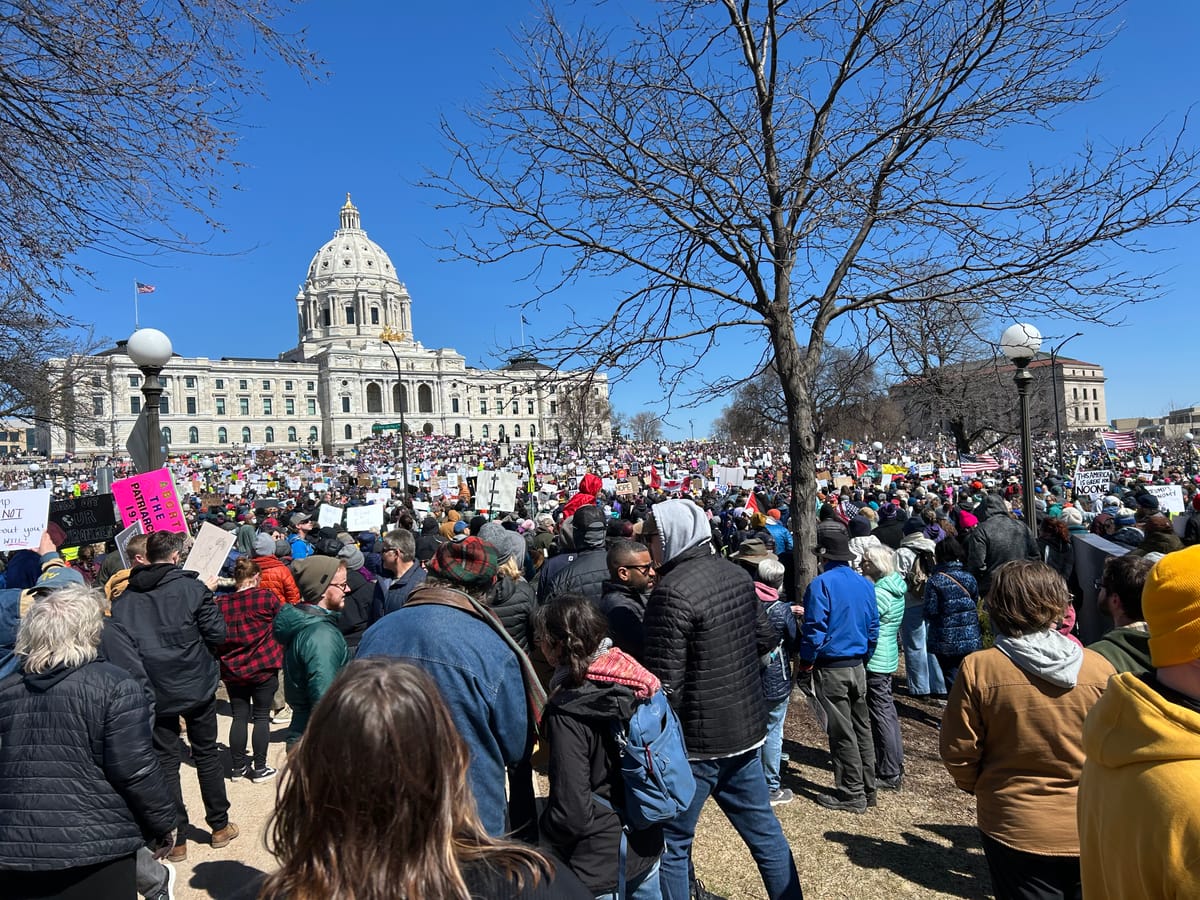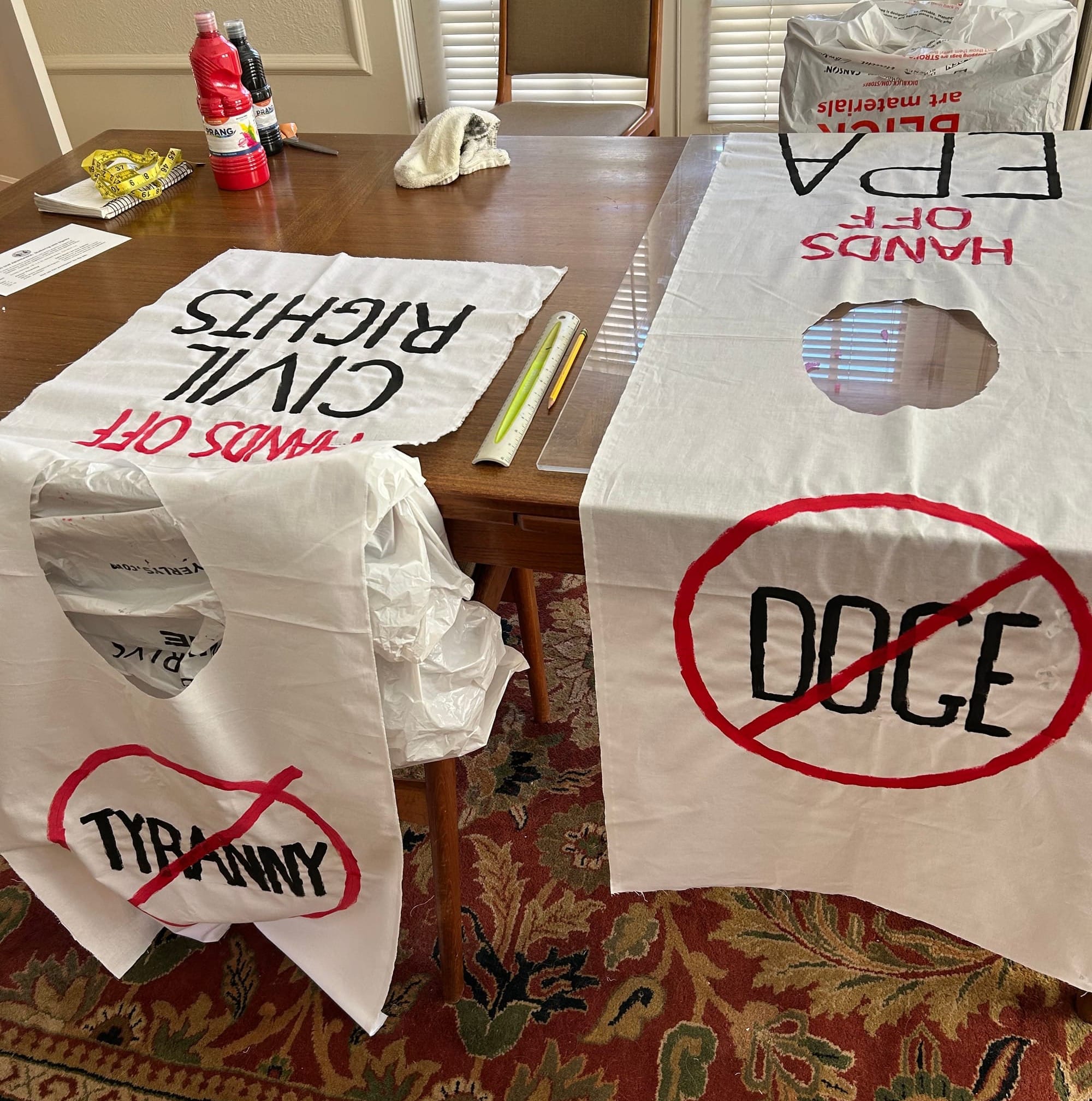You marched—now what?

A lot of grandparents were at “Hands Off” protests last Saturday. Many, like me, were out there to protect freedoms for our grandchildren, and everyone’s grandchildren. It was heartening to see the peaceful but determined crowds, and to sense a growing solidarity. We need that momentum for the long haul!
For guidance on what to do going forward, I’ve been looking to historian Timothy Snyder’s book, On Tyranny: Twenty Lessons from the Twentieth Century, which derives its advice from effective resistance to authoritarians of the past. (For a short reading of the key points, click here.) Some of the actions Snyder recommends are truly heroic—notably, being prepared to die for the cause—but many of the actions are well within a cowardly Grandma’s range. I’ll pass those on here, concentrating also on actions that can protect, educate, or directly include our grandchildren (before involving the grandchildren, talk with their parents!).
Snyder’s historical approach may be particularly motivating to today’s grandparents. Most of us are old enough to have roots and stories that cover the 20th century. My grandfather, and my husband’s, served at the tail end of WWI. My father-in-law served in WWII. All lived through the McCarthy era. I came alive to politics marching with my aunt against the Vietnam War. Others of us whet our teeth on the Civil Rights Movement; or on Stonewall, the AIDS crisis, and LGBTQ+ rights; or have emigrated to the US fleeing abuses of power. So we’ve been here—or at least, related places—before. We know something about authoritarian and totalitarian impulses and regimes, here and abroad, and we or people we know have been subjected to them, feared them, and fought against them. These fighters weren’t distant others: They were our ancestors and friends and compatriots—maybe us.
So, the actions:
Snyder’s Lesson #2 is “Defend institutions.” Definitely in everyone’s wheelhouse! The idea is that all kinds of institutions—our libraries, places of worship, schools, courts, newspapers—are independent of an authoritarian regime until they give in. Help them stay independent through participation, and through speaking out if they show signs of wavering. This is one area in which grandchildren can be involved: Children should have a voice in what happens to institutions that directly affect them, and interested and involved grown-ups can help their voices be heard.
Lesson #4 is “Take responsibility for the face of the world.” If symbols of hate appear, Snyder says, noticethem. Don’t let them become normal. Words, gestures, posters, etc., matter. It’s not OK to use a Nazi salute, or to use coded language to denigrate groups of people, or to signal loyalty to tyrants with slogans or flags. When you can, call it out. Gently help your grandchildren see it, too—it’s so easy for young kids to imbibe whatever is around them. At the very least, don’t participate.
Lesson #5 is “Remember professional ethics,” and stand up for those ideals rather than authoritarian demands. For grandparents who are still working, this one is important. What does your health profession say about serving all? What does your legal profession say about fairness? Your service profession about service? Law enforcement about procedures and restraint? Your scientific profession about truth? Guiding your actions by these ethics, rather than by an authoritarian’s wishes, will go a long way toward keeping national norms centered. That is a gift to your grandchildren. So is talking with them about your choices, when the occasion arises.

Lesson #9 is “Be kind to our language.” The basic advice here is to speak for yourself. Don’t parrot someone else’s talking points. And no, it’s not ironic that I’m quoting Snyder. I’m “being kind to our language” by thinking about what he has to say and putting it in my own words and context—the idea that grandparents can do this. When you talk politics or ethics with your grandchildren, you can go beyond the parroting, adding context and your own thoughts. And you can encourage your grandchildren to do the same—it’s all too easy for them to go along with what they are told: Help them learn to ask questions.
Lessons #10 and #11 are “Believe in truth” and “Investigate.” We grandparents learned how to do research and how to evaluate sources (remember all those 4x6 cards with your research paper notes?). It was and is tricky to get to the bottom of things, but you can keep doing it on issues important to you, and keep handing on to your grandchildren the message that there is a truth of the matter—and that truth is important.
Lesson #12 is “Make eye contact and small talk.” Small talk humanizes the people on all sides of the conversation. It helps build bonds of trust, and begins the process of uniting people as citizens who care about each other. What might seem like a lesson in social graces for the grandchildren has much wider implications, especially in our divided and fragmented society.
Lesson #13 is “Practice corporeal politics.” That is, show up for the protest, the strike, the march! In person! If it’s safe, bring the grandkids. Maybe you’re worried about the crowd at a demonstration, but the kids could help make signs. And remember that local politics is important, too.
Lesson #15 is “Contribute to good causes.” If you can do this, your contributions have a three-fold effect. First, they enable whatever good it is that your chosen organization does. Second, they support civil society. Third—not as crucial, but nice—they help you feel good about where your money is going. Maybe you’d like to talk with your grandchildren about where your donation would do the most good. I used to use this as an exercise for my college students: After all due debate, they decided as a class where to send my real $100 (shout-out to Mo and Ramona for the idea).
Lesson #16 is “Learn from peers in other countries.” Talk to friends and colleagues who live abroad or who have extensive experience abroad, so you can keep alive your understanding that other people do things differently. Also, Snyder says, be sure everyone in your family has a passport.
Lesson #17 is “Listen for dangerous words.” For example, when the government labels people as “extremists” or “terrorists,” the reclassification allows the government more power to track and punish them—perhaps unjustly. Teach your grandchildren to listen behind the word for what the powers that be really mean—and whether or not the word fits.
I’ve skipped #s 1, 3, 6-8, 14, 18, and 20. These are the harder ones, or in a couple cases not relevant to many. I’ve saved #19 for last not only because I’ve listed the lessons in order, but also because it brings us back to the ancestors, friends, and compatriots we started with. Lesson #19 is “Be a patriot.” Not a nationalist, who cares only about American power, and their own. A patriot cares about the welfare of their compatriots—all Americans—and about the values that guide the country. How to do this? In Snyder’s words, “Set a good example of what America means for the generations to come. They will need it.” In a thousand ways, do this for your grandchildren!